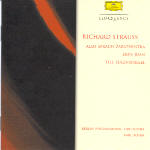The recordings of Also Sprach Zarathustra by Karl Böhm and Herbert von Karajan have one unique feature in common, both conductors jazz-up the two-note response (by shortening the note values) to that famous opening trumpet call. This alteration was made famous by the film “2001: A Space Odyssey”, and while it’s debatable which conductor used it first, there’s no denying it gives the music a 20th century feel. By comparison, Strauss’s original is decidedly old-world, and interestingly, so is the remainder of this interpretation. Böhm’s recording from 1960 (before the piece had gained any “space” associations) makes one fully aware of the work’s roots in the 19th century symphonic poem, fathered by Franz Liszt. Tempos are fast and flowing, giving a very Lisztian feel to “Of Joys and Passions” and other sections. This Zarathustra generates an excitement not usually heard today, but also not quite reaching the heights of Fritz Riener’s contemporaneous performances which have tremendous sweep, passion and playing by the Chicago Symphony that the Berlin Philharmonic of the time could only dream about.
Böhm’s Don Juan has an attractively light touch, portraying an impetuous young man rather than the hot-blooded scoundrel of George Szell’s blazing Cleveland performance, and Till Eulenspiegel lacks Szell’s low-comedy, making one wonder why this good-natured fellow had to be executed. The Berlin Philharmonic’s playing is more secure in the last two works (they would later give spectacular performances for Karajan). Deutsche Grammophon’s recording reveals many inner details (bassoon trills in the Dance-Song) that we never knew were there, but lacks the impact of RCA’s for Riener. Still, this release is of interest to those who want to hear more of this great Strauss conductor.
































